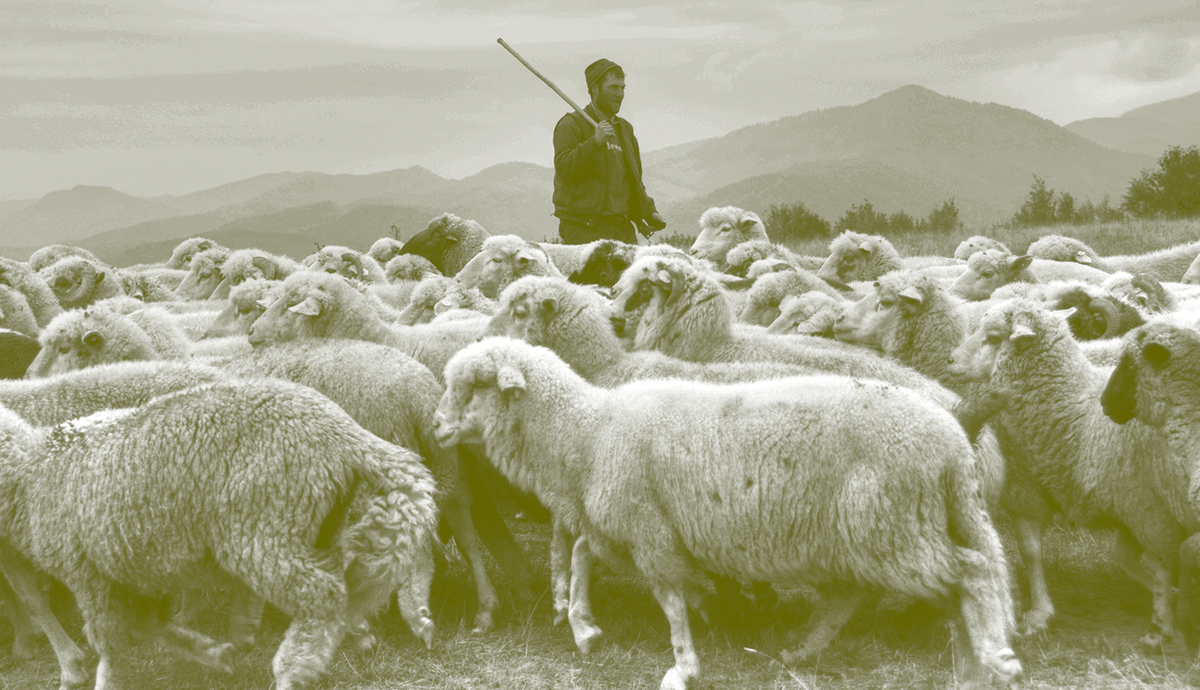I AM the Good Shepherd—but Who Are We?
JOHN 10:11-18
Fourth Sunday after Easter
Analysis by Mark A. Marius
Jesus said:] 11“I am the good shepherd. The good shepherd lays down his life for the sheep. 12The hired hand, who is not the shepherd and does not own the sheep, sees the wolf coming and leaves the sheep and runs away—and the wolf snatches them and scatters them. 13The hired hand runs away because a hired hand does not care for the sheep. 14I am the good shepherd. I know my own and my own know me, 15just as the Father knows me and I know the Father. And I lay down my life for the sheep. 16I have other sheep that do not belong to this fold. I must bring them also, and they will listen to my voice. So there will be one flock, one shepherd. 17For this reason the Father loves me, because I lay down my life in order to take it up again. 18No one takes it from me, but I lay it down of my own accord. I have power to lay it down, and I have power to take it up again. I have received this command from my Father.”
DIAGNOSIS: Sheep, Hired Hands, and Wolves Endangered
Step 1: Initial Diagnosis (External Problem): In Need of Protection
Everyone knows we are sheep, even if we try not to be. We may hide our vulnerability, but we can’t live in this world without feeling it. And that vulnerability causes many of our problems.
OR maybe you are also a hired hand like me. Religious Leaders, Medical Professionals, Educa-tors, Government Employees, Law Enforcement, etc. are all paid to care for (sheep) people. IN this role our problem becomes the responsibility we share for all those in our care. We find it im-possible to meet the needs of everyone while looking out for our own.
AND we may not want to admit this either, but we act like wolves. It is the sin in us we can’t escape; it compels us to feed on others to live. It’s the law of nature for wolves. And sheep are easy targets. Without a doubt, attacking people is a big problem.
Step 2: Advance Diagnosis (Internal Problem) Exposed
Because we feel our vulnerability we act like sheep and turn to anyone or anything that offers protection. We don’t trust that the Good Shepherd has things in control, so at the first sign of danger we are prone to scatter.
Danger also exposes hired hands. When overpowered we can’t help but care more for our own well-being than those we are called to care for. After all, even hired hands cannot stop the wolf from attacking.
And wolves, by their very nature, attack. You either attack and feed, or you die. Sin cannot af-ford to die. So, when the wolf in us howls, we lunge to preserve our sinful self.
Step 3: Final Diagnosis (Eternal Problem): Prey
As sheep, we know our days are numbered. We’ve seen that whether we scatter or stay with the herd, the wolf is coming for us. It’s only a matter of time before we become the kill.
When hired hands run away from the wolf when it attacks, they lose their livelihood by. IF the wolf doesn’t kill you, you certainly will have to answer to the owner of the flock, which won’t be any better.
Finally, we wolves kill sheep again and again. But we hardly feel good afterward. Our actions outrage the owner of the sheep, which turns us wolves into prey.
PROGNOSIS: I AM, So We May Be—Together
Step 4: Initial Prognosis (Eternal Solution): Saved by Sacrifice
Jesus has become the Good Shepherd for the sake of the sheep, the hired hands, and the wolf.
By laying down his life, Jesus spares the sheep from death. The Good Shepherd becomes easy prey so that sin, death, and the devil—all marks of the wolf—attack him instead of us.
Because of that sacrifice, the hired hands are saved from running off at the first sign of trouble. We can stay and care for the sheep as the Good Shepherd intended.
And the wolf? Even our inner wolf is saved—believe it or not. The wolf can now feed on the sacrifice of the Shepherd instead of tangling with the hired hands or preying on the sheep.
Step 5: Advanced Prognosis (Internal Solution): Sacraments Keep Us from Scattering, Scaring, and Scrounging
Sheep now have the protection they need to remain part of the flock. With the death threat of the wolf gone, we no longer need to scatter from the fold. The Good Shepherd sees to it that we have everything we need.
As hired hands, we can trust the tools provided to us to tend to our sheep without being scared off. In the Sacraments, we hear the voice of the Good Shepherd, giving us grace, mercy, and forgiveness, and keeping our sheep connected as a flock. The Sacraments also eliminate the need to scare the wolf off, Hired hands have been given license to feed sheep and wolves together. (Our inner wolf feeds on the sacrifice of the shepherd and as sheep, we feed on God’s Word.)
Step 6: Final Prognosis (External Solution): Fearless Flock
Wolves, hired hands, and sheep—all participating peacefully in the same flock? Yep. Thanks to the Good Shepherd. And as the Good Shepherd takes up his life again to continue the owner’s work, we all can be fearless as the fold increases. We set aside differences in recognition of our need for the Good Shepherd. Because, as sheep, we will still experience vulnerability—but not abandonment. As hired hands, we will still experience limitations—but it won’t stop us from caring for the flock. And our inner wolf will still be compelled to attack—but instead of attacking the sheep and hired hands, we will hear the voice of the Good Shepherd reminding us that he is the only necessary sacrifice.




You must be logged in to post a comment.